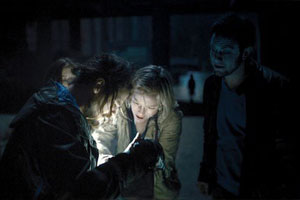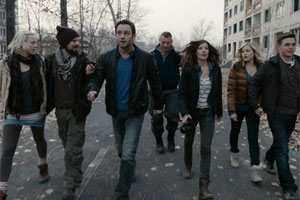Fear has a new name
From the imagination of Oren Peli, who radically altered the horror genre with Paranormal Activity (as writer and director), comes this outstanding shocker. Peli's original story (co-written by Carey van Dyke and Shane van Dyke) continues his matchless exploration of the supernatural and the inclination of people to let their thoughts run wild when things go bump in the night, or when the dark side of human nature reveals itself in unexpected and mysterious ways.
Its uniqueness lies in its simplicity; a group of six young holidaymakers who, looking to go off the beaten track, hire an "extreme" tour guide. Ignoring warnings, he takes them into the city of Pripyat, the former home to the workers of the Chernobyl nuclear reactor, but a deserted town since the disaster more than 25 years ago.
It's as simple as that and as frightening as hell.
I am convinced that if the audience could read the Russian graffiti on the walls of the ghostly buildings, it would read: "Warning! Do not enter under any circumstances."


It all starts as fun
As with Paranormal Activity, in which the ordinary is turned inside out, it all starts as a fun and thrilling adventure into an exclusive paradise, a ghost city of nuclear waste where radiation is still active and lethal. You know that it is idiotic even to consider such an exploration. There are certain things our mothers warn us against - and common sense should logically prevail. But human nature rarely obeys rules of wisdom or warnings from Mother Nature and fascination soon turns into a terrifying nightmarish hell in Chernobyl Diaries, when the unthinkable surfaces.
Without spoiling the story or giving anything away, let's just say that fear has a new name and Chernobyl Diaries proves that the success of any great horror film absolutely lies in its execution, as well as in its visual and production designs. First-time director Brad Parker succeeds in keeping the tension tight and mean, and his sometimes wicked sense of absurdity allows for some truly frightening moments and unforeseen revelations. The world that the characters enter seems normal, yet it is wrapped in a blanket of terror.
Some convincing performances
The characters are brought to life through some convincing performances; the stark and gritty realism has an almost documentary feel to it and contributes to the suffocating fear that holds the audience tightly in the grasp of the filmmakers, who skilfully manipulate every second from start to finish.
It is refreshing to find that the film does not continue the worn-out style of viewing the story from singular (or multiple) handheld cameras, but observes the action from a distance. And if you are wondering why you are holding your breath, don't be surprised; the intimate darkness that hides horrifying secrets is not good for those who have a phobia of the dark or closed spaces.
Chernobyl Diaries is not a film that you can experience on DVD and is safer to watch on the big screen in the company of friends. But, be warned: Chernobyl Diaries is not for the faint hearted. If only nightmares were this pleasant, then Chernobyl Diaries would be a walk in the park.
Terror that is not tangible unleashes the worst kind of fear; unseen adversaries manifest themselves in the most imaginative (and entertaining) ways, doing what it does best, up the scare level to the max.
Behind the scenes
Chernobyl Diaries is the brainchild of writer/producer Oren Peli, who first found success in the horror genre with the incredibly popular Paranormal Activity. Just as that subject was the result of a commonplace occurrence - hearing strange noises in his new house - he was again inspired while performing an everyday activity: surfing the Internet. "The idea came to me when I saw a photo blog posted by a girl traveling through Pripyat on a motorcycle," Peli recalled. "That was the first time I'd heard about Pripyat, and that it had been evacuated overnight, then left as is, sort of like a ghost town imprinted in time and history, basically unchanged except for the effects of nature and wild animals. I thought the place looked eerie and beautiful and captivating, and a little sad. And that it could be the perfect setting for a very creepy movie."
He discussed the idea with fellow producer Brian Witten, who remembered: "After Oren mentioned the idea to me, I immediately went home and scoured the Internet for info on Pripyat. I was overwhelmed by the history and visuals, and enthusiastically encouraged Oren to flesh it out.
"I wanted to make a movie that grabs them and doesn't let go until the closing credits," he continued. "The Pripyat in our story is a haunting place. The thought of being there alone at night is frightening, but not being alone is terrifying."
Peli, known for the "found footage" style of filmmaking, wanted to capitalise on the realism of that very notion, but also go in a different direction. "We decided to shoot it almost documentary style." To that end, he said: "We had the actors improvise a lot of their dialogue. In fact, much of the script was taken from the improv we did in rehearsals, in order to create a very authentic feel for the movie."
The filmmakers even took the element of surprise to the set, often keeping the cast in the dark as to some of the shocks to come in the film, in order to capture their natural reactions to the most frightening aspects of the story. Parker felt that this technique, paired with these characters left vulnerable in a remote location with an unseen threat, "ratcheted up the dread to maximum levels. I believed an intimate point of view would be the most immersive for viewers," he related.
Go behind the scenes at www.writingstudio.co.za/page4122.html
About Daniel Dercksen
- Get ready for some great escapism in cinemas this April - 3 Apr 2024
- What to expect at the cinema this March - 27 Feb 2024
- Oscar fever brews: Here's what's at the cinemas this February - 29 Jan 2024
- Top 10 films of 2023 - 28 Dec 2023
- What to expect on your screens in January 2024 - 21 Dec 2023
View my profile and articles...